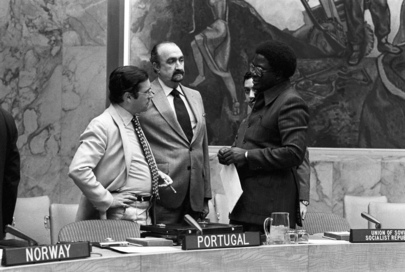
Update on the Historical Commission of Inquiry 1979

July 1, 1979: The Security Council established a formal Commission of Inquiry in March in regards to the current status of Arab Occupied Territories, sending commissioners into the field to examine all areas of concern relating to the situation of settlements in Arab territories occupied by Israel. The Commission, composed of seven commissioners from UN Member-States, began its investigation through two primary channels: the first through formal government leadership from Jordan, Egypt, Syria, and Israel; and the second via gathering direct testimony from refugees and displaced persons within the occupied territories. The Commission formally approved the report and sent it forward to the Security Council as of 1 July 1979.
The Commission welcomed statements of President Haifez al-Assad from Syria, Prime Minister Mudar Badran of the Hashemite Kingdom of Jordan as well as formal communications from the King of Jordan and President Anwar Sadat of Egypt. Commissioner Fort stated that according to Permanent Representative Blum of Israel, “Israel would not cooperate in our investigation because they believe that sufficient public information on the situation in their settlements already exists, which has consistently supported their legality.” Further, “Due to Israel’s refusal to participate in our investigation, their concerns are not recognized in our report to the Security Council.”
Commissioner Stueckrath of Mexico noted that Jordan was instrumental in the creation of the commission, bringing forth the request for the commission to the Security Council. Commissioner Stueckrath provided a summary of concerns and issues from affected nations. Jordanian officials took issue with access to water in the occupied territories as well as restrictions placed on water rights by Israel. Syria moved its military to the Syria/Israel border in anticipation of future attacks across formal borders. Egypt called for mutual demilitarization to the commission’s surprise, according to Commissioner Stueckrath and validated previously established facts. The commission also was able to get direct testimony from refugees now stationed in Egypt on their personal experiences leading up to and including the flee from Israeli occupied territories.
Keep Up With The Accords
More to read
The AMUN Accords is a premier resource for fact-based Model United Nations simulations. We are always looking for new contributors. Want to write for the AMUN Accords? Check out out the submission guidelines and then get in touch!




